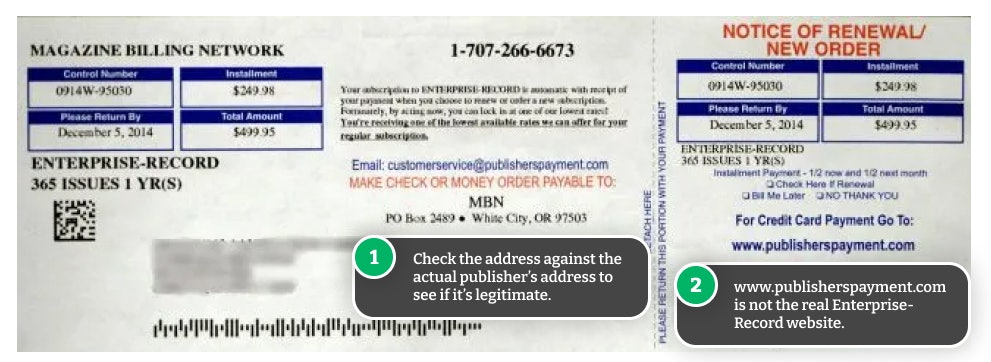- How Magazine Subscription Scams Work
- Protect Yourself from Magazine Scams
- Examples of Magazine Subscription Scams
- Victim of a Magazine Subscription Scam? Here’s What You Should Do
- Frequently Asked Questions
Skillful scammers have mastered mimicking subscription renewal notices from legitimate magazine publishers to trick consumers into revealing personal information or paying a fee. These scammers may offer re-subscription discounts, auto-renew cancellation refunds, or debt collections—all part of magazine subscription scams.
How Magazine Subscription Scams Work
Your magazine subscription is about to expire. Deceptive renewal notices are causing several subscribers to fall prey to a widespread fake subscription or cancellation scam. The first step to beating this kind of scam is to understand how it works and red flags to watch out for.
Here's how the scam works.
You Receive Notice from a Magazine About Your Subscription
The notice could claim to be from a magazine that you actually subscribe to or one you don't and could be in person, by mail, by phone, or email. Either way, the end game is the same—they want your personal information and/or money. The caller will either tell you that your subscription is about to be canceled or you can renew, but to do either, you'll need to provide some information.
Example Phone CallHello. We have noticed your subscription for the Reader's Digest has not been paid and will need to be renewed or canceled. I can help you with this no problem. I just need your payment information to renew, or I can cancel the subscription and refund your account.
You Give Your Credit Card Information
If you want to keep your magazine subscription, the caller will ask you for your updated payment information so you can continue to receive your magazines as usual.
If it's a subscription that you don't have, you tell them to cancel it. It's not uncommon to have subscriptions that you're not aware of these days, so the scammer will scare you into thinking this is the case. In this scenario, the scammer will ask you to provide your personal information, including your credit card information, so they can confirm your account and cancel your subscription.
There is a different version of this scam whereupon canceling your subscription; the caller will say they have accidentally refunded too much money into your credit card account. They will then ask you to give the money back in the form of gift cards.
You Lose Your Money; Your Identity is Stolen
Once you give the scammer your credit card and personal information, they will be able to use this to either regularly charge your card for a fake magazine subscription or other items for their own personal gain.
If you buy gift cards for the scammer, they will use the balance of the gift cards almost immediately, and you'll later find out that they never credited your account balance in the first place, putting you out of hundreds of dollars.
Protect Yourself from Magazine Scams
These nationwide fraudulent magazine subscription solicitation scams have caused the Federal Bureau of Investigation and the U.S. Postal Inspection Service to investigate the experiences of defrauded victims. According to the investigation, these entities have identified dozens of companies involved in fake subscription sales located within the United States and worldwide. These scams have affected tens of thousands of subscribers and resulted in millions of dollars in losses.
These fake subscription scams typically rely on predatory tactics and inattentive consumers. Scammers' predatory tactics might include pressure sales, hidden information in the fine print, lack of company contact information for cancellations, debt collection threats, and more.
How to Beat Magazine Subscription Scams
The best way to beat this magazine subscription scam is never to provide your credit card or personal information over the phone or in person until you confirm you're speaking with the legitimate company.
If you happen to receive a random renewal notice, you’ll want to confirm the address on the form to the subscription mailing address in your magazine. You should avoid sending money to an address different from the one inside your magazine. However, this isn’t a foolproof red flag because some magazines and newsletters have a special P.O. Box for subscription renewals.
If you doubt the legitimacy of a magazine renewal or cancellation notice, contact the magazine publisher directly. Find the magazine's contact information online or on the magazine itself.
If the scammer is claiming you have a subscription to a magazine you're unaware of, check your bank accounts and credit cards first to confirm that you've been getting charged for this subscription.
Protect Yourself From This Magazine Scam
The best way to protect yourself from these magazine subscription scams is to check your credit card and bank statements regularly to stay on top of which subscriptions you are (and should be) paying for. Various apps help you monitor your credit card transactions and subscriptions in particular.
Apps like Truebill and Trim help you track your current and unwanted subscriptions by connecting to your bank and credit card accounts. This will let you see quickly and easily what subscriptions you are being charged for regularly.
Who Has Been Targeted So Far?
Illegitimate subscription companies target the elderly and other vulnerable individuals and trick them into unwittingly signing up for expensive magazine subscription packages or paying for cancellation fees.
In 2020, federal officials revealed a few indictments charging 60 defendants for their roles in a $300 million telemarketing subscription scam affecting more than 150,000 older individuals. Scammers coerced these individuals into paying more than $300 million in unwanted magazine subscriptions, some costing aging victims more than $1,000 a month.
Examples of Magazine Subscription Scams
An example of the magazine subscription scam involved a 69-year-old woman who heard from a man supposedly from a large international law firm inquiring about her past due balance of $1,100 with the Family Readers Club.
He noted she could pay off the balance with a one-time fee of $400. When the woman declined, he became aggressive and threatened to pursue legal action and renew her subscription for three years.
Magazine Subscriptions Scams Involving Gift Cards
According to the Michigan State Police, unsuspecting Michiganders have either given away access to their computer and personal information or nearly $4,000 worth of non-refundable gift cards. In Michigan cases, scammers claim the subscriber’s magazine subscription will automatically renew for a couple of hundred dollars.
When the subscriber doesn’t want to pay for renewal, the scammer takes the subscriber through a cancellation and refund process. For instance, a scammer might say the subscriber is eligible for a $600 refund. Yet, the scammer mentions accidentally crediting the subscriber’s account with a $6,000 refund. Then, the scammer tells the subscriber to send the difference in the form of gift cards.
While the Michigan subscription cancellation scam has started gaining traction this year, these deceptive renewal notices aren’t confined to this state in the Great Lakes. Attorney General’s Offices in California, Colorado, Minnesota, and New York (to name a few) have issued warnings about magazine subscription fraud to protect subscribers from unauthorized and misleading notices from major publications.
Magazine Subscription Scams: New Subscriptions
Scammers contacted individuals with one or more magazine subscriptions and offered renewals at a reduced rate. These scammers, though, weren’t calling to renew or reduce the price of the individual’s subscription. Rather, they tricked these subscribers into signing up for entirely new magazines. Some consumers were fraudulently billed by up to 10 companies at a time, which they couldn’t afford.
In one case, a 78-year-old woman had been unknowingly spending $1,402.91 on magazines annually after falling for magazine scams.
Victim of a Magazine Subscription Scam? Here’s What You Should Do
Magazine subscription scams are widespread, but there is some protection for you if you fall victim thanks to fraud protection policies by most banks and financial institutions.
Report the Fraud to Your Bank
If you’ve fallen prey to a magazine subscription scam, contact your bank and report any of these charges as fraud. Your bank may:
- Reverse the charge
- Refund fraudulent charges back to your account
- Cancel your cards issue new ones to prevent further fraudulent charges
You can also request a chargeback for fraudulent transactions. If a merchant receives a significant number of chargebacks, banks may rescind their ability to accept consumers' payments. This step helps ensure other individuals aren’t falling victim to the same scam and scammer.
Report the Magazine Subscription Scams to the FTC
You should also report any financial fraud like this to the Federal Trade Commission (FTC), an independent government agency tasked with enforcing civil U.S. antitrust law and consumer protection.
File a complaint online and provide:
- Your contact information
- The product or service purchased
- Information about the seller
- The transaction details.
Unfortunately, the Federal Trade Commission can’t return your money, but your report can help them track down the scammers and help others avoid being scammed.
Check Your Credit Report
If you think you may have fallen victim to a magazine subscription scam, you should also watch your credit report.
Scammers may send subscription bills to collections to pressure you to send additional funds. If you notice a bill in collections on your credit report, contact the company claiming the debt and request:
- Proof that you owe money
- Proof that they own the right to pursue payment
More often than not, these companies won’t have such proof available, and the fake charges will be removed.



Comments